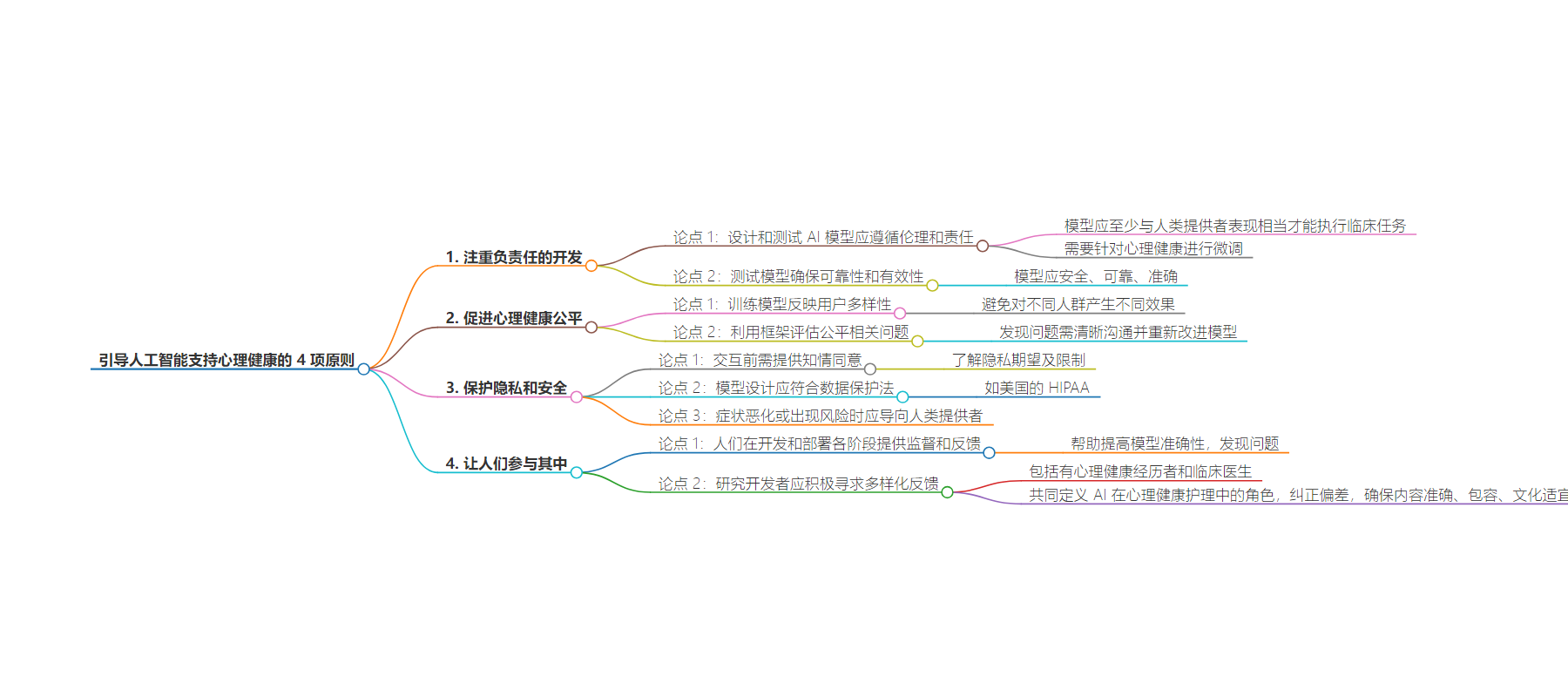包阅导读总结
1. 关键词:AI、精神健康、责任发展、公平、隐私安全
2. 总结:本文探讨了用 AI 支持精神健康的 4 个原则,包括负责任的开发、促进精神健康公平、保护隐私安全和让人们参与监督反馈,指出在保障下 AI 可助力缩小精神健康服务供需差距。
3. 主要内容:
– 负责任的开发
– 设计和测试需遵循伦理道德
– 模型应达人类提供者水平,且可靠有效
– 促进精神健康公平
– 训练模型反映人群多样性
– 利用框架评估公平相关问题,发现问题要改进
– 保护隐私和安全
– 需提供知情同意,遵守相关数据保护法律
– 症状恶化或有风险时应转至人类提供者
– 让人们参与
– 各阶段进行监督和反馈
– 寻求不同人群反馈,合作确保内容准确、包容等
思维导图:
文章地址:https://blog.google/technology/health/google-ai-and-health/mental-health-google-ai-principles/
文章来源:blog.google
作者:Dr. Megan Jones Bell
发布时间:2024/8/8 17:40
语言:英文
总字数:758字
预计阅读时间:4分钟
评分:87分
标签:AI 在心理健康中的应用,AI 道德开发,心理健康公平,隐私和安全,用户参与
以下为原文内容
本内容来源于用户推荐转载,旨在分享知识与观点,如有侵权请联系删除 联系邮箱 media@ilingban.com
Focus on responsible development
Researchers and developers need to design and test AI models ethically and responsibly. As just one example, these models should only perform clinical tasks when they can handle them at least as well as human providers. To reach that threshold, AI models need to be fine-tuned for mental health. It’s also essential to test models to make sure they’re reliable (perform consistently) and valid (perform in line with evidence-based practice). For instance, if AI is going to answer people’s mental health questions or support therapists in providing treatments, the model should be safe, reliable and accurate.
Advance mental health equity
Unfortunately, there are inequities in who receives which mental health diagnoses, along with disparities in who has access to different kinds of mental healthcare. Stigma can also get in the way of getting support.
It’s imperative to train models to reflect the diversity of the people who will interact with the AI models in question — otherwise, you risk producing models that work differently with different groups of people. It’s also important to make use of frameworks that can assess AI-generated performance for equity-related problems. And when researchers and developers do identify problems, they should communicate those issues clearly and rework the models as needed until they can ensure equitable performance.
Protect privacy and safety
Privacy and safety are paramount in mental health-related AI. Anyone interacting with AI for mental health reasons should first need to provide informed consent, including understanding what expectations of privacy they can reasonably have along with any limits to those expectations. Given the sensitivity of personal, mental health information, the developers of mental health AI models should design those models to comply with relevant data protection laws in their region (e.g., in the United States, the Health Insurance Portability and Accountability Act [HIPAA]).
When it comes to mental health, safety also includes directing people to human providers and higher levels of care when symptoms worsen or when risk for serious mental health concerns like self-harm come up. Ultimately, appropriate trust is only garnered when AI models keep mental health information private and when people are kept safe.
Keep people in the loop
People should provide oversight and feedback in every stage of developing and deploying AI to support mental health.
Rigorous, ongoing human involvement can help make AI models for mental health more accurate and uncover potentially problematic responses. For instance, a model can suggest wording for a mental health practitioner to use in their clinical notes, but the practitioner should still decide whether to include that language.
When it comes to responsible use and equity, researchers and developers should actively seek feedback from individuals who reflect the diverse populations they’re aiming to help. That includes those with lived experiences with mental health concerns and clinicians. Through this kind of collaboration, people are able to co-define the role AI plays in mental healthcare; help to identify and correct biases; and ensure AI-generated content is inclusive, culturally appropriate and accurate.
We know technology can only do so much. However, I believe with these safeguards in mind, AI can play a role to help to close the ever-widening gap between the need for mental health services and the availability of quality mental health information and providers.
